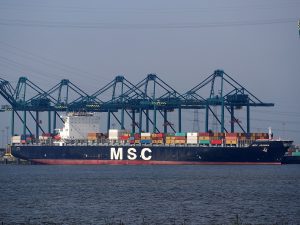The First IMO 2020 Violation Goes to MSC

MSC Joanna – photo by Alf van Beem
Let’s take a break from the relentless COVID-19 news, kind of, to talk about a topic we thought would be dominating this year’s international shipping news: IMO 2020. Leading up to the implementation of the International Maritime Organization’s carbon emission mandate, there was much speculation on how well carriers would do at following the rules around limiting fuel carbon emissions to 0.5% from 3.5% and how likely actual enforcement of those rules would be.
About a week and a half ago, a story started unfolding that gives us our first real look at violation and enforcement.
MSC Ship Illegally Carries High Sulfur Fuel
Mediterranean Shipping Company (MSC), the shipping line set to overtake Maersk as the world’s largest carrier over the course of this year and next, was the first major carrier caught breaking the new IMO 2020 rules. Mike Wackett reported in a Loadstar article:
The 9,784 teu post-panamax MSC Joanna has been prohibited from operating in UAE waters for one year and its master banned indefinitely and facing legal action from the country’s Federal Transport Authority (FTA) after allegedly failing to comply with an order to debunker 700 tons of heavy fuel oil (HFO) before entering the Dubai port of Jebel Ali.
Subsequently, Greg Knowler gave more details on MSC’s infringement in a Journal of Commerce (JOC) article:
According to the UAE’s Federal Transport Authority, the 9,200 TEU MSC Joanna failed to debunker 700 tonnes of high-sulfur fuel before calling Jebel Ali on March 6, despite being given repeated warnings. The vessel then called at the UAE port of Khalifa, with a second call at Jebel Ali on March 13.
Both articles outline how carriers were given a grace period between the January 1st, 2020 date when IMO 2020 went into effect and full implementation on March 1st of the rule that ships not fitted with exhaust-gas-cleaning “scrubber” systems are not allowed to carry non-compliant, high sulfur fuels.
Seeing one of the very largest carriers in the world violate this IMO 2020 rule is certainly not good optics. It even looks worse when Wackett added the following in his Loadstar article:
Shipping lines – including Maersk and Hapag-Lloyd – founded the Trident Alliance, an industry lobby group aimed at ensuring a level playing field on the enforcement of the sulphur cap. MSC is not currently a member of the alliance.
It would almost seem as though MSC, skirting the IMO 2020 law while not joining other carriers in lobbying for fair enforcement of said law, is operating in a way that would give the vast shipping company a competitive edge over its competition that is in compliance. However, that might be a bit of a leap to judgment.
MSC’s Response to Violation
Immediately upon the breaking of this story, MSC reiterated its commitment to compliance with IMO 2020 and pointed to its large investment in scrubbers for the company’s very sizeable fleet. Indeed, MSC has been at the forefront of pushing forward the use of scrubbers for compliance with IMO 2020 through the lead up to the new requirements. In an article that Wackett wrote last year, he reports:
Of the 12 top-ranked carriers, Alphaliner said, MSC had the “most extensive scrubber programme”, with more than 200 ships expected to have systems installed.
That does show a considerable investment on MSC’s part in compliance with IMO 2020. It’s also to MSC’s credit that the company did not jump to the argument that the MSC Joanna is just one ship in its vast fleet. Such an argument would be like the company trying to trivialize the violation. Additionally, it would be easy for critics to say that it was just the one ship that got caught.
Instead, MSC said it was investigating how this violation could have occurred. There is, however, something I find a little off-putting in the way MSC said it was investigating what happened with the MSC Joanna. Wackett quotes MSC:
“We are closely investigating how it came about that the traditional marine fuel for EGCS [exhaust gas cleaning systems] installation testing was left on board the MSC Joanna in a sealed tank during its recent UAE port calls, as EGCS installation on this vessel has been delayed several months this year. MSC Joanna has used only compliant low-Sulphur fuel since IMO 2020 came into effect,” [an MSC spokesperson] said.
While MSC didn’t say something lame like this happened on just one of our many, many ships, it does sound like the company’s spokesperson was already making excuses, or at least pointing at mitigating circumstances, for the violation. The fuel was in a sealed tank. The fuel was left onboard, as if to say it had been planned to be removed. The fuel was for scrubber testing, which has the implication that it was not for use in the scrubber-less Joanna. The Joanna was supposed to have a scrubber system installed, but that got delayed. So maybe the fuel was for testing the scrubber the Joanna was supposed to have by this point.
It appears that last excuse is the one MSC is now going with. And they’re adding the coronavirus to the excuse. That’s why at the beginning of this article I said “kind of” about us taking a break from COVID-19. A Container Management articles reports:
[MSC] stated: “Many of the shipyards where EGCS installation has been taking place are in areas affected by the current COVID-19 pandemic and this has generated a large backlog of installations for shipowners.
“In particular, Chinese shipyards were closed or partially closed for a significant period of time following the extended Lunar New Year holiday as the country grappled with the new coronavirus outbreak. This has impacted shipowners’ schedules for retrofitting ships, as has been widely documented in the media”
The shipping line acknowledged that the MSC JOANNA is one of those ships which has subject to an EGCS delay and its installation is currently scheduled for June 2020.
Shipyards have actually been backed up on retrofitting ships with scrubbers since before COVID-19 hit. At the beginning of December last year, Universal Cargo posted an article about the world fleet not appearing ready for IMO 2020, including a section on ships stuck waiting for scrubbers.
IMO 2020 was not sprung on the international shipping industry. Preparation for it, including installation of scrubbers on ships, certainly could and, I believe, should have begun earlier than it did. However, the actual installation of scrubbers was slower than expected, causing delays, and the novel coronavirus outbreak in China, which spread through the world, certainly added to that.
That being said, scrubber installation does not create a legitimate excuse for the MSC Joanna violating IMO 2020 by carrying high sulfur fuel after warning and months of grace period to get within compliance.
The Punishment
Does that mean the punishment is appropriate for the crime? Here’s the punishment according to Insurance Marine News:
The UAE’s Federal Transport Authority (FTA) advised on March 16th that the MSC Joanna had been banned operating in its waters for one year and had banned the vessel’s captain from working on any ships calling at UAE ports. Reuters reported that the UAE said it had commenced legal action against the master for violating the regulations.
It should be noted that the captain and master referred to above is the same person. It’s unclear the exact legal action the master faces. Should the captain face career-threatening consequences for this violation? What consequences should MSC, as a company, face, if any? Is whatever punishment put toward the ship, its captain, and/or crew enough without laying specific sanctions on the company under which the ship sails enough?
I suppose the ship, its captain, and its crew could just be reassigned to different routes, which do not call on UAE ports. That might make small consequence, legal action against the ship’s master aside, to MSC and the Joanna.
This being the first big IMO 2020 violation, how it is punished sets a tone. Does the tone sound right? Will it make carriers less likely to violate IMO 2020 in the future or make them shrug their shoulders at the consequences. Or is it more the pressure from shippers and the rest of world to curb pollution and public image that is more likely to keep carriers in line than specific punishments for violations?
Let us know what you think. Do these sanctions seem like too much? Too little?




